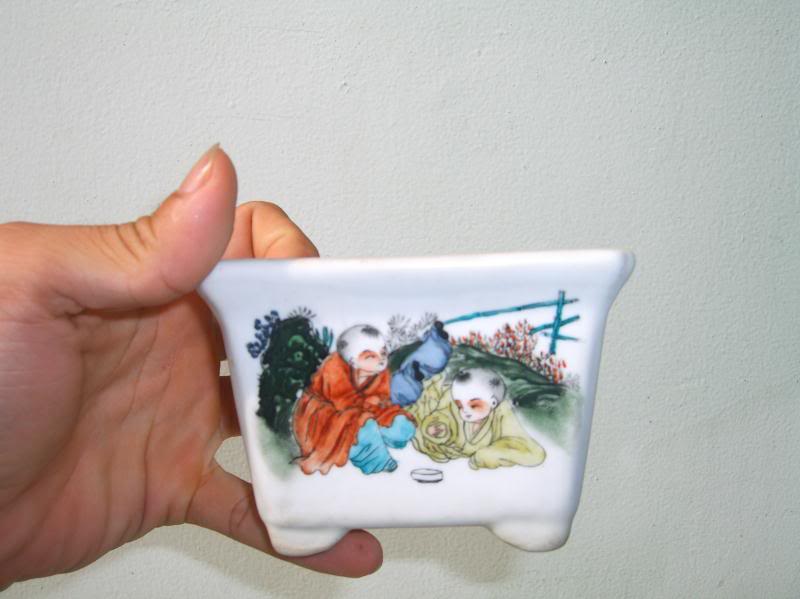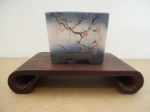Why are Chinese Pots in fashion?
+6
Mnhthu99
Russell Coker
peter krebs
Ryan B
Hans Vleugels
cbobgo
10 posters
Page 1 of 1
 Why are Chinese Pots in fashion?
Why are Chinese Pots in fashion?
I have been told, and I have noticed from eBay and other sites that Antique Chinese pots are very collectible and extremely high priced nowadays.
My question is, how do you know that a Chinese pot is valuable? I know that the chinese production quality pots are produced in bulk... and they are actually pretty nice in quality. But how do you know that after 30 - 40 years this production pot would be worth some decent money?
The reason I ask is because I have seen some very valuable 100 - 150 year old Chinese pots without any hanko stamps or even signatures. How do we know that they weren't the cheap (in reference to price) production produced pots at one time? I mean they have some pretty amazing patina, but I am guessing that would appear on any pot that is kept (or used) for a long time.
- S
My question is, how do you know that a Chinese pot is valuable? I know that the chinese production quality pots are produced in bulk... and they are actually pretty nice in quality. But how do you know that after 30 - 40 years this production pot would be worth some decent money?
The reason I ask is because I have seen some very valuable 100 - 150 year old Chinese pots without any hanko stamps or even signatures. How do we know that they weren't the cheap (in reference to price) production produced pots at one time? I mean they have some pretty amazing patina, but I am guessing that would appear on any pot that is kept (or used) for a long time.
- S
Guest- Guest
 Re: Why are Chinese Pots in fashion?
Re: Why are Chinese Pots in fashion?
were they making cheap production bonsai pots 150 years ago? I think almost anything that you can say for sure is 150 years old is going to have significant value, weather it was made cheaply at that time or not.
Or did you mean to ask - how can you tell a valuable 150 year old pot from a more recently made cheap pot?
- bob
Or did you mean to ask - how can you tell a valuable 150 year old pot from a more recently made cheap pot?
- bob

cbobgo- Member
 Re: Why are Chinese Pots in fashion?
Re: Why are Chinese Pots in fashion?
I think all antique bonsai pots are 'in fashion', no matter where they came from. Patina and the fact they are looking realy old has something to do with it. And China is a very big country, and probably lots of Chinese antique pots are being offered today because they made a lot of pots then. And don't forget the Chinese are also masters in reproducing an 'antique look'. Not all things which are offered are gold...

Hans Vleugels- Member
 Re: Why are Chinese Pots in fashion?
Re: Why are Chinese Pots in fashion?
This is a very big question, and One with a lot of answers. I agree with everything Hans said...that being said, fake patina is identifiable, if you have an eye for details. The age of many "antique" chinese pots is often overstated in the west. The modern age of Bonsai pottery, with minimalist pots, really only began in the late 1800s, so not a whole lot of pots with the modern qualities of minimalism and subdued features are older than that. Some of the most valuable "antique" Chinese pots are only 70-100 years old, as some of the best Kilns were founded in the 1920s.
Patina is a major factor for value, but quality is just as important. Just because it's old does not make it extremely valuable. 80-120yr old pots without stamps are easily had for under $300, these are mold made pots for the most part, tartara produced. Some without stamps are worth sky's the limit. You have to know what you're looking for. Is it handmade, tightly carved from a single block of clay perhaps? Then Its valuable. No matter what you may think about Chinese production pots, they're poor to mediocre quality. The devil is in the details, study old chinese and Japanese pots and youll develop an eye for quality. Will they be worth anything in 80-100 years...sure, less than $300, same as the Chinese Production pots of the last century! Real value and investment would be quality Japanese pots that are 20-50 years old, and Chinese handmade pots that are 40-60yrs old. Ryuens, Yuzans, Inos, Gekkous, and Chinese p
Kilns like Syungado and later production "Hotels", these can be had for a few hundred bucks, and when they have the dignity of age, will be worth as much as Chinese pots today.
Another reason Old Chinese pots are so valuable is technique and clay. There are techniques and natural clay colors that are lost to time, and nobody can figure out how to reproduce them. Some potters in Japan became well known and valuable just by virtue of figuring out how to reproduce a single clay color, or glaze, from Old China. Hokido comes to mind(though they're not especially valuable)
Ikkou is another.
http://japanesepots.wordpress.com/
Patina is a major factor for value, but quality is just as important. Just because it's old does not make it extremely valuable. 80-120yr old pots without stamps are easily had for under $300, these are mold made pots for the most part, tartara produced. Some without stamps are worth sky's the limit. You have to know what you're looking for. Is it handmade, tightly carved from a single block of clay perhaps? Then Its valuable. No matter what you may think about Chinese production pots, they're poor to mediocre quality. The devil is in the details, study old chinese and Japanese pots and youll develop an eye for quality. Will they be worth anything in 80-100 years...sure, less than $300, same as the Chinese Production pots of the last century! Real value and investment would be quality Japanese pots that are 20-50 years old, and Chinese handmade pots that are 40-60yrs old. Ryuens, Yuzans, Inos, Gekkous, and Chinese p
Kilns like Syungado and later production "Hotels", these can be had for a few hundred bucks, and when they have the dignity of age, will be worth as much as Chinese pots today.
Another reason Old Chinese pots are so valuable is technique and clay. There are techniques and natural clay colors that are lost to time, and nobody can figure out how to reproduce them. Some potters in Japan became well known and valuable just by virtue of figuring out how to reproduce a single clay color, or glaze, from Old China. Hokido comes to mind(though they're not especially valuable)
Ikkou is another.
http://japanesepots.wordpress.com/
Last edited by Ryan B on Sat Nov 12, 2011 4:35 am; edited 1 time in total (Reason for editing : Addition)
Ryan B- Member
 Re: Why are Chinese Pots in fashion?
Re: Why are Chinese Pots in fashion?
Thanks for the insight Ryan. I just started collecting quality Japanese pots, and I wanted to know what to look for before I get a Chinese pot. It is easy to identify whether a pot was handmade from the strokes visible from inside the pot. But how can you tell a real patina from fake? Also, I have noticed that some valuable antique Chinese pots are slightly bowed (courtesy of Matt where I had the opportunity to get a closer look at these amazing pots). Any idea whether a pot being slightly bowed is something to look for.
- S
- S
Guest- Guest
 Re: Why are Chinese Pots in fashion?
Re: Why are Chinese Pots in fashion?
As to bowing, thats a detail that you'll find in pots of any quality level and age. It's a shrinkage and warpage issue during firing. Marks on the interior, finger and thumb impression, are only signs of 2 methods of handwork, turbineri and wheel. Some of the most valuable and highest quality pots will have NO marks whatsoever. These are master craftsmen pots, most carved from single blocks of clay, like Ryuens and Yuzans, though I have seen many Chinese pots where the joining of the feet or base was impossible to distinguish. It's these types of details that make quality work. Sloppy clay work, uneven lines, unsmoothed unions are inferior.
Pick up the three "Bonsai Pot Illustrated Book" and the Hatanaka book(9204), and study them. You can get them here: http://bonsai.ocnk.net/product-list/8
You have to have a tight eye for detail to identify false patina. It's mostly created using manganese or similar wash that creates a dark film. It has to be applied in some way, either painted on by brush or sprayed. Brushes leave you traces, while spraying coats in a way different from real patina. Real patina begins in nooks and crannies where dirt collects easily, false patina coats the outside of these first, it's backward. False patina will be completely uniform if sprayed, the real deal never is. I suggest checking out Peter Teas excellent blog post on the subject, there's little I can tell you that isn't in there.
http://japanesepots.wordpress.com/
Pick up the three "Bonsai Pot Illustrated Book" and the Hatanaka book(9204), and study them. You can get them here: http://bonsai.ocnk.net/product-list/8
You have to have a tight eye for detail to identify false patina. It's mostly created using manganese or similar wash that creates a dark film. It has to be applied in some way, either painted on by brush or sprayed. Brushes leave you traces, while spraying coats in a way different from real patina. Real patina begins in nooks and crannies where dirt collects easily, false patina coats the outside of these first, it's backward. False patina will be completely uniform if sprayed, the real deal never is. I suggest checking out Peter Teas excellent blog post on the subject, there's little I can tell you that isn't in there.
http://japanesepots.wordpress.com/
Last edited by Ryan B on Sat Nov 12, 2011 6:29 pm; edited 1 time in total (Reason for editing : Left out tagline)
Ryan B- Member
 Re: Why are Chinese Pots in fashion?
Re: Why are Chinese Pots in fashion?
Patina on old pots.
http://www.bonsaipots.net/index.php?page=patina-on-old-pots
Best wisches
Peter
_____________________________________________
THE WORLD OF THE POT: http://www.peter-krebs.de/
http://www.bonsaipots.net/index.php?page=patina-on-old-pots
Best wisches
Peter
_____________________________________________
THE WORLD OF THE POT: http://www.peter-krebs.de/

peter krebs- Member
 Re: Why are Chinese Pots in fashion?
Re: Why are Chinese Pots in fashion?
Peter,
Your article is very informative, and makes me want to use my pots with trees in them rather than store them in a closet. Any ideas on how to remove the lime-scale from both glazed and un-glazed surfaces without damaging?
- S
Your article is very informative, and makes me want to use my pots with trees in them rather than store them in a closet. Any ideas on how to remove the lime-scale from both glazed and un-glazed surfaces without damaging?
- S
Guest- Guest
 Re: Why are Chinese Pots in fashion?
Re: Why are Chinese Pots in fashion?
Thanks very much Peter. I'm very familiar with your site! Its a great resource, Suburbia, where you can have a look at some very nice old Chinese and Japanese pots(and also the marvelously crafted pots from the author!)
There's another pottery book listed on his site as well the 4 I recommended, that is a must have for anyone collecting old pots, "Bijutsu Bonki" a two volume collection that is The Bible of pottery resources. Every Big Japanese nursery has a copy. If you're a wealthy man it's easily had for around a grand! Its becoming hard to find in Japan, so the cost continues to rise!
There's another pottery book listed on his site as well the 4 I recommended, that is a must have for anyone collecting old pots, "Bijutsu Bonki" a two volume collection that is The Bible of pottery resources. Every Big Japanese nursery has a copy. If you're a wealthy man it's easily had for around a grand! Its becoming hard to find in Japan, so the cost continues to rise!
Ryan B- Member
 Re: Why are Chinese Pots in fashion?
Re: Why are Chinese Pots in fashion?
Thanks Ryan and Peter.
Also, check out John Naka's second book. There's a good, concise explanation of the terminology. I was very lucky. Seeing and holding these rare and expensive pots isn't something you ever forget! Once you've been around the real deal - the clays, patinas and workmanship - the fakes and knock-offs are easy to spot.

Russell Coker- Member
 Re: Why are Chinese Pots in fashion?
Re: Why are Chinese Pots in fashion?
Hi Ryan,
Hi Russel,
Thank you for the nice compliment.
Hi suburbia,
Lime peel on?, Put your pots in Coca Cola one or two days, then wash him with water.
Best wishes
Peter
Hi Russel,
Thank you for the nice compliment.
Hi suburbia,
Lime peel on?, Put your pots in Coca Cola one or two days, then wash him with water.
Best wishes
Peter

peter krebs- Member
 Re: Why are Chinese Pots in fashion?
Re: Why are Chinese Pots in fashion?
Please introduce you to a pot of ancient China


[img][/img]
 [img][/img]
[img][/img]




[img][/img]

 [img][/img]
[img][/img]


Mnhthu99- Member
 Re: Why are Chinese Pots in fashion?
Re: Why are Chinese Pots in fashion?
The reason I ask is because I have seen some very valuable 100 - 150 year old Chinese pots without any hanko stamps or even signatures. How do we know that they weren't the cheap (in reference to price) production produced pots at one time?
You don't. Especially if they're on Ebay or other I'net auction sites.
"Antiques" are hot items. So hard to prove without direct contact with the item.

JimLewis- Member
 why are chinese pots in fashion
why are chinese pots in fashion
One other reason, Chinese pots are in fashion is, because the Chinese are very anxious to buy back as many old pots they can get their hands on, now that they have money-they have created a big demand, just as they are buying back everything old Chinese.
kora- Member
 Re: Why are Chinese Pots in fashion?
Re: Why are Chinese Pots in fashion?
Because of they have fashion goods producer and marketer. This case is designed for a course in marketing and business approach, exclusively in luxury manufacturer management, international marketing.
openxcellaus- Member
 Re: Why are Chinese Pots in fashion?
Re: Why are Chinese Pots in fashion?
Ryan B wrote:This is a very big question, and One with a lot of answers.
http://japanesepots.wordpress.com/
Ryan,
You have a interesting speciality.. pots. Seems not so many are obsessed by pots... its always trees. Wondering though about two statements
"...these are mold made pots for the most part, tartara produced. "
"...are only signs of 2 methods of handwork, turbineri and ...".
Never heard of these processes, can you describe them.
bigDave

BigDave- Member
 Re: Why are Chinese Pots in fashion?
Re: Why are Chinese Pots in fashion?
Ryan,
Some of the old Chinese pots don't have any hanko/signature or any indication of the potter or the kiln. However, they are excellent in quality (thick heavy walls, amzaing patina, hand-made...) and generally heavy for the size. I am almost certain that these are 70+ years old just by the look of it. Do you know why these pots are missing hankos?
I have noticed that the Chinese pots with hankos are slightly pricier than the ones without hankos. Is there any correlation there, or is it just me? I personally would like to know a little about the pot and that is why I would prefer a hanko (maybe that is why there is more demand for pots with hankos).
Some of the old Chinese pots don't have any hanko/signature or any indication of the potter or the kiln. However, they are excellent in quality (thick heavy walls, amzaing patina, hand-made...) and generally heavy for the size. I am almost certain that these are 70+ years old just by the look of it. Do you know why these pots are missing hankos?
I have noticed that the Chinese pots with hankos are slightly pricier than the ones without hankos. Is there any correlation there, or is it just me? I personally would like to know a little about the pot and that is why I would prefer a hanko (maybe that is why there is more demand for pots with hankos).
Guest- Guest
 Re: Why are Chinese Pots in fashion?
Re: Why are Chinese Pots in fashion?
i don't know what it is but i like to support the potters of this day and age doesn't mean i don't appreciate nice old japanese and chinese pots even if i had all the money in the world and could spend whatever on a pot i would still buy pots from potters today. there are so many good potters walsall, erin pottery, bryan Albright, nick Lenz, Ron lang, and stone monkey just to name a few. thats just me i guess i don't see why old japanese or chinese pots would be better its about the pot that works with the tree best
Guest- Guest
 Re: Why are Chinese Pots in fashion?
Re: Why are Chinese Pots in fashion?
Thanks for your feedback Andre.
Note that the topic is about Chinese pots. That does not mean that I don't admire Western pottery... in fact, I am a huge fan of Michael Hagedorn pots, and I like Rayner, Lang and a few European pots too. This topic is meant for readers who are exploring the quality, styles, categorization and overall value of old to antique Chinese pots.
By the way, I agree with you that Chinese pots don't have to be better, however quality of one pot makes it better than the other (be it Chinese or not).
Note that the topic is about Chinese pots. That does not mean that I don't admire Western pottery... in fact, I am a huge fan of Michael Hagedorn pots, and I like Rayner, Lang and a few European pots too. This topic is meant for readers who are exploring the quality, styles, categorization and overall value of old to antique Chinese pots.
By the way, I agree with you that Chinese pots don't have to be better, however quality of one pot makes it better than the other (be it Chinese or not).
Guest- Guest
 Re: Why are Chinese Pots in fashion?
Re: Why are Chinese Pots in fashion?
i've just seen to many people say that the only good pots are chinese and japanese pots. i guess i wasn't built that way. i'll use which ever pot is best if chinese japanese western or european pot is best
Guest- Guest
 Similar topics
Similar topics» trends on asian pots
» Knowledge Database for Chinese Pots
» Chinese antique pots (glazed)
» A few pots
» Shell 2010
» Knowledge Database for Chinese Pots
» Chinese antique pots (glazed)
» A few pots
» Shell 2010
Page 1 of 1
Permissions in this forum:
You cannot reply to topics in this forum






